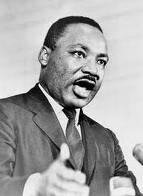The Drum Major Instinct
This post was written by Harry Boyte, co-director of the Center for Democracy and Citizenship, for the By the People Blog. Boyte worked with the Rev. Dr. Martin Luther King, Jr., as a field secretary with the Southern Christian Leadership Conference during the American Civil Rights Movement.
 While working in South Africa last month, I came upon a book chapter by Nicholas Rowe, dean of humanities at St. Augustine College in Johannesburg. His piece in Re-imagining the Social in South Africa; Critique, Theory and Post-apartheid Society brought me back to a sermon the Rev. Dr. Martin Luther King, Jr. gave shortly before his murder, titled “The Drum Major Instinct.”
While working in South Africa last month, I came upon a book chapter by Nicholas Rowe, dean of humanities at St. Augustine College in Johannesburg. His piece in Re-imagining the Social in South Africa; Critique, Theory and Post-apartheid Society brought me back to a sermon the Rev. Dr. Martin Luther King, Jr. gave shortly before his murder, titled “The Drum Major Instinct.”
Rowe describes how St. Augustine College was created 10 years ago out of a deepening concern that “now apartheid has been dismantled…we have ended up with this individualistic materialism.” He cites research that a spreading culture of consumerism is the most important factor in crime and violence in South Africa.
Against this dominant trend, St. Augustine’s goal is “to assert the common good as a framing value against the individualist materialist norms and logic.”
This brings me to the Drum Major Instinct, delivered by Martin Luther King on March 4, 1968. Using the story of Jesus’s disciples James and John who expressed the desire to be “by his side” in heaven, King had much the same message of St. Augustine College, with a down to earth, realistic dimension. He challenged his audience to acknowledge that the desire for recognition and success are part of the human condition.
“Before we condemn [James and John] too quickly, let us look calmly and honestly at ourselves, and we will discover that we too have those same basic desires for recognition, for importance,” King said.
The problem comes when larger purposes are lost in the pursuit of materialistic success. “You see people over and over again,” said King, “[who] just live their lives trying to outdo the Joneses. If this instinct is not harnessed, it becomes a very dangerous, pernicious instinct.”
King moved from the individual level to race relations. “The poor white has been put into this position, where the only thing he has going for him is the false feeling that he’s superior because his skin is white—and can’t hardly eat and make his ends meet week in and week out.” More broadly, the “drum major instinct” of success with narrow or selfish purpose, King argued, is shaping the world. “I would submit to you this morning that what is wrong in the world today is that the nations of the world are engaged in a bitter, colossal contest for supremacy,” said King. “And if something doesn’t happen to stop this trend, I’m sorely afraid that we won’t be here to talk about Jesus Christ and about God and about brotherhood too many more years.”
King concluded by pointing out that Jesus, in challenging his disciples James and John, didn’t condemn their desire for distinction. “He did something altogether different. He said in substance, ‘Oh, I see, you want to be first. You want to be great. Well, you ought to be. If you’re going to be my disciple, you must be.’ But [Jesus] reordered priorities. And he said, ‘Yes, don’t give up this instinct. It’s a good instinct if you use it right. Don’t give it up. Keep feeling the need for being important. But I want you to be first in love. I want you to be first in moral excellence. I want you to be first in generosity. That is what I want you to do.”
King’s message is powerfully and disturbingly apt today, in a time of unbridled greed, unrestrained competition, and rampant consumerism. Public work–engaging with others in public to do work with lasting value–can be understood as developing our sense of larger purpose and harnessing “the drum major instinct” to build the commonwealth.



